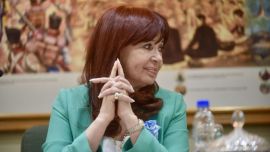The passing of Latin America's first pope sparked an outpouring of sorrow — and gratitude — from Buenos Aires to Santiago, with everyone from Lionel Messi to disparaged migrants mourning a figure who spoke to and for the region's faithful.
Brazilian Monique Neves turned emotional just remembering Pope Francis holding her then-three-month-old son in Rio's cathedral more than a decade ago.
It was 2013, just months after Jorge Bergoglio's election as the first non-European pope in more than a millennium. Francis had made Brazil — the country with the world’s largest Catholic population, and his native Argentina’s footballing rival — his first foreign port of call.
Almost four million people turned out to greet him, and he made sure to speak to Brazilians, and to Latin Americans, on their own terms.
He had encouraged the young faithful to “break down evil and violence, to destroy and overthrow the barriers of selfishness, intolerance and hatred, so as to build a new world.”
Neves, now 44, returned to Rio's cathedral on Monday to mourn the 88-year-old pope's death. There she spoke fondly of his legacy “of resilience, of love for others, regardless of colour, social class, religion, sexual orientation.”
That more inclusive message — and Francis’s entreaties for an often hidebound and deeply conservative church to “go to the periphery” — resonated deeply in a region marked by stark inequality and immense diversity.
Fellow mourner Clelia Maria da Silva recalled that before seeing the pope in Rio, she had become estranged from the church.
“I went to Copacabana,” she said, “and there I met a simple, humble pope who spoke our language: the language of the poor.”
For Venezuelan migrant Marisela Guerrero, Francis’s repeated public support for those forced to leave their homelands was especially meaningful.
“He encouraged us migrants a lot — he gave words of encouragement to all who left their countries,” said the 45-year-old, now living in Chile.
“We have lost the pope of the poor, of the excluded, of those so often cast aside,” said Archbishop Jorge García Cuerva in Buenos Aires.
Estela Barnes de Carlotto, president of the Grandmothers of Plaza de Mayo, said there would be no one like him again. “He was like a brother to me,” she told the Radio 10 station. “He cared about everyone — from the smallest victim to the most powerful.”
Carlotto, who had planned to visit the pope the following month, added: “We want popes like this one.”
Political leaders across the continent — many of whom had publicly clashed with the pope over the years — offered their tributes.
Argentina's President Javier Milei, who once branded Francis an “imbecile” who “promotes communism,” said on social media: “Despite differences which today seem minor, being able to meet him in his kindness and wisdom was a true honour for me.”
Milei declared seven days of national mourning. In February 2024, he visited the Vatican, embracing the pope during a meeting that marked a thaw in relations.
The relationship between Bergoglio and Argentine politics — especially the country’s 1976–1983 military dictatorship — had long been contentious.
When he was elected pope in 2013, his name was linked to the disappearance of two Jesuit priests detained by the regime. But he was also praised by human rights groups for his later advocacy.
The tributes extended far beyond the late ponfiff's homeland.
In Brazil, President Luiz Inácio Lula da Silva praised Francis’s “simplicity, courage and empathy,” and highlighted his role in putting climate change on the Vatican’s agenda — a cause Lula has championed.
He also commended the late pontiff’s critique of “economic models that have led humanity to commit so many injustices.”
Chilean President Gabriel Boric hailed Francis’s “genuine effort to bring the Church closer to the people in a world where the spiritual seems to have been pushed into the background.”
Venezuelan President Nicolás Maduro described him as “a great universal Latin American” and “a man of light and hope.”
On Telegram, he said the pope had been “a friend of renown” to Venezuela and its people, and thanked him for helping bring international recognition to José Gregorio Hernández and Carmen Rendiles — two Venezuelan saints.
Cuba’s President Miguel Díaz-Canel stressed the “closeness” Francis had shown to Cuba and the mutual affection between the pope and its people.
Honduran President Xiomara Castro called him “a great spiritual guide, close to the humble, a defender of peace, of migrants, of justice, and of care for our common home.”
Francis’s death also touched the wider Catholic world in Latin America, where vigils and masses were held from Mexico to Paraguay.
In Mexico City’s Basilica of Guadalupe, Sister Esther Hernández, 35, said: “It was a blessing that he came from the American continent. He understood our culture, our language — he was a shepherd of the people, a vital presence for us.”
In Santiago de Chile, 77-year-old Francisca Álvarez wept during mass. “He made such an effort as a man on this Earth,” she said, holding a photo of the pope with a handwritten prayer on the back. “Now he is in the Lord’s arms.”
– TIMES/AFP


























Comments